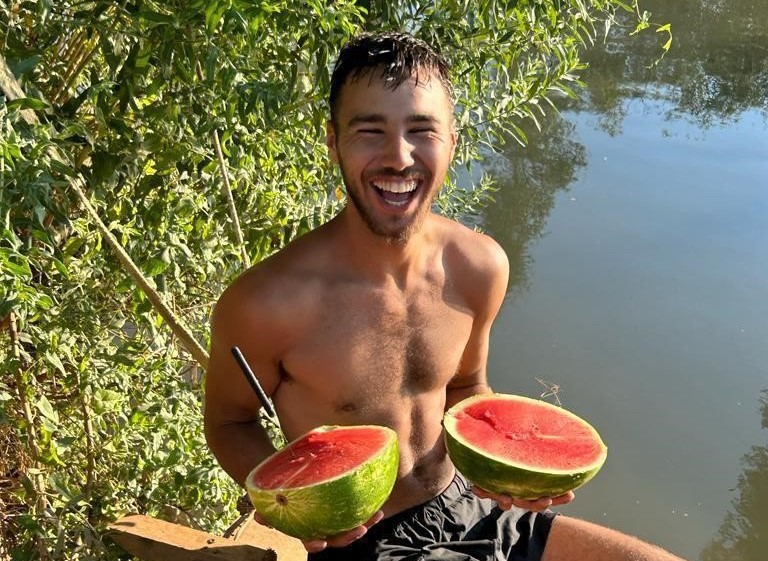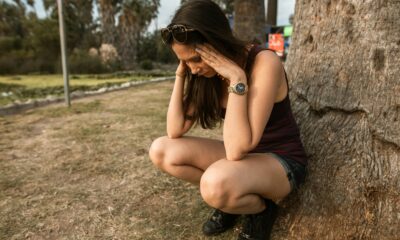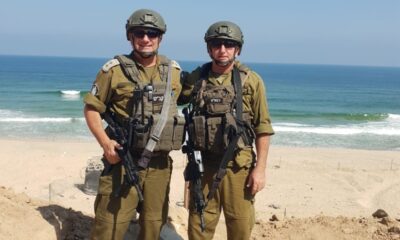
Israel

SA olah mourns death of son killed by Hamas
Shoam Ben Harush, 20, had the world at his feet. He had one more year left of his compulsory military service in the Israel Defense Forces and was already planning a lengthy holiday with his friends upon completion. South Africa was one of the places on his wish list. He would travel to Cape Town to visit his 90-year-old grandmother, and show his friends all the wonderful sites where his mother, Martine (née Gordon), was born and raised.
Sadly, he was shot in the jaw on 7 October following an unprovoked attack by Hamas terrorists who infiltrated Kibbutz Kerem Shalom near the Gaza Strip where he was stationed. He died three weeks later from a fatal head wound after putting up a goliath battle in the Hadassah Ein Kerem Hospital in Jerusalem. His devoted family never left his side. He was visited by hundreds of people, from all walks of life, who travelled across the length and breadth of the country to pray for his recovery. Smiling photographs of him were displayed by his bedside allowing nurses and doctors to become familiar with him and treat him like family.
In life as in death, Shoam touched countless people, said friends and family this week. The agony of having to bury a son fatally wounded in battle is a sorrow no parent should ever endure.
“Our hearts are broken. We still cannot believe he’s gone,” said his devastated mother, Martine, 56, who attended Herzlia High School and studied zoology and marine biology at the University of Cape Town before making aliya in 1990. She visits her mother and close friends in Cape Town every year.
Shoam was described by family and friends as someone who loved being in nature, was a true friend and mensch, and someone who immediately drew people to him when he walked into a room. “My boy was beautiful inside and out,” Martine said.
During the week of shiva, the family received a steady stream of hundreds of visitors a day.
“People, some total strangers, would say, ‘You don’t know me but …’ and then the wonderful stories would be told of how he had touched their lives, all before he turned 21,” said Martine, who is a high school English teacher and studied a Masters of Arts in Holocaust Studies at Haifa University.
From the moment news of his shooting reached far-flung communities, prayer groups were set up and dozens of tehillim groups created, all devoted to his speedy and full recovery.
Doctors told the family that his healthy organs including his heart, liver, lungs, and kidneys had been successfully donated.
All that his parents and five siblings have left is a lifetime of cherished memories created by this special neshoma who “shone a light so bright” that hundreds of people showed up for his funeral in spite of an official limit of 30 people for security reasons. A human chain spanning about 2km followed the funeral procession, in which hundreds of mourners draped in the Israeli flag ushered him from the shul to his final resting place in Hispin. The procession stopped traffic, whereupon drivers got out of their cars and joined in the chain to honour him. So many of Shoam’s friends, many serving in the army, couldn’t attend as they were protecting the country’s borders.
A father who had lost his son in battle the previous week spoke at the funeral. He said Shoam had earned the nickname “everyone’s lucky charm” due to his infectious smile and unwavering positive outlook on life.
Shoam’s siblings not only had to bury their brother and “best friend”, some were also mourning the loss of several friends slaughtered during the attack at the Supernova music festival.
Recounting the fateful day when he was shot, Martine said the family was still piecing together fragments and snippets of information.
The observant family were celebrating Simchat Torah in Hispin and hosting family friends from Cape Town who had joined them for the holiday.
“We were at shul when we started to hear news of a terrorist attack in the south. In Israel, we hear this often and usually it’s speedily dealt with, so we carried on with yomtov. We had no idea how serious things were.”
At about 14:00, someone came to the house and told Martine’s husband, Ilan, that there was a rumour that Shoam had been shot. He wanted to confirm the information before telling her. Hours passed before he was able to get further information. In the meantime, the couple’s oldest son, Bar, 30, was called up to the Lebanon border. He left before hearing of his younger brother’s condition.
Information about Shoam’s shooting eventually reached the rest of the family, who learnt he had been seriously injured, evacuated, and airlifted to hospital. The siblings rushed to the Soroka Medical Center in Beersheba to find out more information.
Martine and Ilan drove three and a half hours from their home in Hispin to the hospital, reaching it at about 22:30.
“It was a scene of chaos. There were bleeding patients everywhere, it was a mess. We went from bed to bed, from ward to ward to try to find Shoam. There were so many anonymous patients, bleeding victims, we stood outside operating theatres with a picture of Shoam, asking the surgeons if they had seen him. They were so busy, they didn’t know who they were operating on.”
Eventually, the family travelled one and a half hours to the Hadassah Ein Kerem Hospital in Jerusalem to try to find him. They reached there at about 03:30, and found him. He had already been operated on for about eight hours. Doctors had successfully removed the bullet and were hopeful that he would make a full recovery even though it would be a long and painful process.
“We had so much hope,” said Martine.
Sadly, Shoam didn’t wake up. He had suffered irreversible brain damage. Top neurosurgeons around the world were consulted for second opinions, all confirming the family’s worst fears. For days, the family prayed he would make a miraculous recovery, relishing every minute they spent with him. They moved into a nearby apartment and took shifts at Shoam’s bedside at all hours.
“He looked so peaceful, we couldn’t comprehend it. We still believed there was a chance. We still don’t get it,” she said.
The family spent Shabbat in his room never leaving his bedside. They sang Shalom Aleichem with nurses and doctors who knew the words, and were visited by well-known musicians and celebrities, rabbis and friends.
“After some time, we were told we needed to start saying goodbye. Even now, I haven’t managed to. I still cannot imagine a world without him,” said Martine.
He died three weeks later on 26 October. The family ends shiva this week.
“It has been the worst time of my life, but we’re overwhelmed by the support, generosity, and outpouring of love from everyone and everywhere. There’s no place like this, we’re totally enveloped with love,” said Martine.
Two of Martine’s closest friends, ex-South Africans from Cape Town, Susan Shaff and Shelley Norwitz, have felt their friend’s pain deeply.
“We were friends in Cape Town before making aliya and have become like family having watched our children growing up and attending all their simchas. Shoam was special,” said Shaff.
“With all the darkness spread by Hamas, the world needs Shoam’s light to spread goodness and heal the world. He loved, and was loved,” said Martine.











Anon
November 7, 2023 at 10:12 am
I’m not sure there are adequate words that can be said so I’ll just say may his memory be a blessing to all who knew and loved him, may his light shine from across the veil and may he be a guide to assist the soldiers to release the hostages and a guide to his fellow soldiers to keep them safe. To the family, may G-d comfort and bless you all of your days.